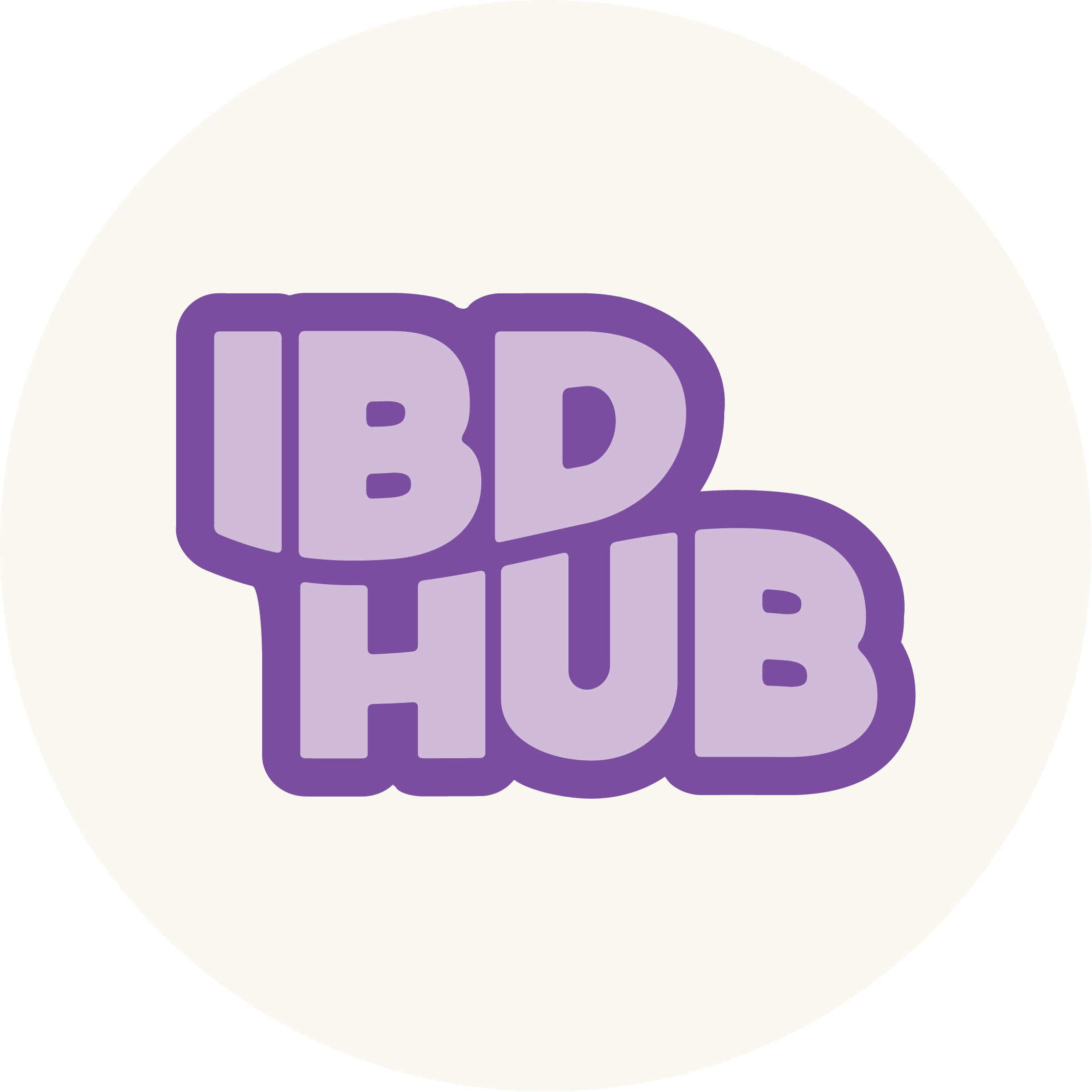
About IBD
Info & Faqs
IBD
Stats
179,420
70%
1 in 3
41%
IBD Stats
Important IBD Faqs
sh*t
you
should
know
What's the difference between IBD and IBS?
Inflammatory Bowel Disease (IBD) is an umbrella term for chronic, immune-driven conditions that cause ongoing inflammation in the digestive tract, mainly Crohn’s disease and Ulcerative Colitis.
IBD causes visible, measurable damage in the gut. Symptoms can include diarrhoea, abdominal pain, rectal bleeding, weight loss, and fatigue. But it doesn’t stop at the digestive system. IBD can also affect joints, eyes, skin, liver, and overall energy levels. Diagnosis usually involves colonoscopy, biopsies, scans, and blood or stool tests. Treatment focuses on calming inflammation and protecting the bowel long-term, using medications (like biologics or immunosuppressants), lifestyle support, and sometimes surgery.
Irritable Bowel Syndrome (IBS) is different. It’s a functional gut disorder, meaning the bowel looks normal under investigation but doesn’t always work as it should. Symptoms include bloating, gas, cramping, and alternating diarrhoea or constipation. Unlike IBD, IBS does not cause inflammation, bleeding, or lasting bowel damage. IBS is uncomfortable and disruptive, but it isn’t a lifelong chronic illness in the same way IBD is.
IBS symptoms are often managed through diet, stress management, and lifestyle changes rather than heavy-duty medications.
The key difference: IBD is a long-term immune condition that can damage the body if left untreated, while IBS is a functional but non-damaging gut disorder.
The easiest way to think of it? IBS is like a headache — frustrating and painful, but not damaging. IBD is like a migraine — a full-blown condition with inflammation, systemic effects, and a need for proper medical treatment.
I keep hearing about IBD 'flare ups'. What are they?
- A “flare-up” refers to a period where IBD symptoms intensify.
- Common signs of a flare-up include more frequent bowel movements, increased abdominal pain, and sometimes fever or rectal bleeding.
- Flare-ups can vary in intensity and duration—some people experience mild symptoms, while others may have severe complications requiring hospitalisation.
- Possible Triggers: Immune responses from infections, hormonal or even changes in medication can contribute. We are still unsure exactly what causes flares, but we do know it is not diet related!
How is IBD diagnosed?
Getting diagnosed with Crohn’s or Colitis isn’t always straightforward. In fact, misdiagnosis is common and many people are first told it’s “just IBS,” food intolerance, or even stress.
That’s why you play a huge role in helping your doctor reach the right diagnosis. Speaking up about your symptoms, family history, and changes you’ve noticed makes all the difference.
Here’s what the process usually involves:
Medical History & Physical Exam
Your doctor will go through your symptoms, family history, and overall health. They’ll do a basic physical exam, but the details you share often point them in the right direction.
Stool Tests & Blood Tests
These help rule out infections and check for signs of inflammation, anaemia, or other abnormalities. They don’t confirm IBD alone, but they help build the case.
Endoscopic Procedures
- Colonoscopy (sometimes combined with endoscopy) allows doctors to look directly at the colon and, in some cases, the small intestine.
- Biopsies (tiny tissue samples) are usually taken to confirm inflammation and rule out other conditions.
Imaging
CT scans, MRIs, or ultrasound can reveal inflammation, strictures, abscesses, or other complications in parts of the bowel scopes can’t easily reach.
Diagnosis is about pulling all this information together — history, lab results, scopes, imaging — and making sure nothing else explains the symptoms better.
Bottom line: Trust your instincts. If you know something isn’t right, push for answers. Early and accurate diagnosis is crucial, because untreated IBD can lead to long-term damage even if symptoms seem mild.
Imaging
- CT scans, MRIs, or ultrasound can assess inflammation and complications.
Is IBD life threatening?
On its own, IBD isn’t usually life-threatening — but it can lead to serious, even life-threatening complications if left untreated. The key is recognising that this is a chronic condition that needs ongoing management, not something that can be ignored or “pushed through.”
With today’s treatments — from anti-inflammatories and immunosuppressants to biologics and, when necessary, surgery — most people are able to control inflammation, prevent complications, and live long, active lives. The goal of treatment is not just to ease symptoms, but to protect the bowel, reduce hospitalisations, and prevent damage that could put your health at risk.
Complications like severe bleeding, bowel perforation, strictures, or abscesses can occur, but they are far less common when IBD is properly managed under medical care.
Bottom line: IBD is a serious lifelong condition, but with the right treatment plan and regular medical care, it is highly manageable — and many people with Crohn’s or Colitis go on to live full, thriving lives.
What does IBD mean?
IBD stands for Inflammatory Bowel Disease. It’s not one condition or a single diagnosis — it’s an umbrella term that covers several forms of chronic, immune-driven inflammation in the digestive tract.
The two main types are:
- Crohn’s disease – can affect any part of the digestive tract, from mouth to anus, and can involve the full thickness of the bowel wall.
- Ulcerative Colitis (UC) – limited to the colon (large intestine), affecting the inner lining and causing ulcers and bleeding.
Other recognised forms include:
- Microscopic colitis – inflammation of the colon that can only be seen under a microscope; often presents with chronic watery diarrhoea.
- IBD-unclassified (IBDU) – when it’s clear there is inflammatory bowel disease, but tests can’t yet confirm if it’s Crohn’s or UC.
All forms of IBD involve the immune system mistakenly attacking the gut, leading to inflammation, symptoms like diarrhoea, pain, and fatigue, and — if untreated — long-term damage.
Key point: IBD is the umbrella. Crohn’s, Colitis, Microscopic Colitis, and IBD-unclassified are the diagnoses that sit underneath it.
What is Ulcerative Colitis (UC)?
Colitis comes from “colon” (large intestine) + “-itis” (inflammation). Ulcerative Colitis (UC) is a chronic condition where the inner lining of the colon becomes inflamed and develops ulcers.
UC only affects the large intestine, but the extent of inflammation can vary:
- Ulcerative proctitis – limited to the rectum
- Left-sided colitis – inflammation extending up the left side of the colon
- Pancolitis – inflammation throughout the entire colon
While UC is limited to the colon, the effects can be felt beyond the gut. People with UC may also experience extra-intestinal symptoms, such as joint pain or arthritis, eye inflammation, skin rashes, fatigue, and anaemia.
Symptoms of UC often include urgent diarrhoea (sometimes with blood), abdominal cramping, and weight loss. The course of disease usually alternates between periods of flare-ups (active inflammation and symptoms) and remission(when symptoms settle).
Bottom line: UC is one of the two main types of IBD. It’s confined to the colon but can have impacts well beyond it, making ongoing treatment and monitoring essential.
What is Crohn's Disease?
Crohn’s disease is a type of IBD that can affect any part of the digestive tract — from the mouth all the way down to the anus. It most commonly affects the small intestine, the colon, or both.
Unlike Ulcerative Colitis (which only affects the inner lining of the colon), Crohn’s inflammation can spread through the entire wall of the bowel. This is why Crohn’s can cause complications such as:
- Strictures – narrowing of the bowel that can block digestion
- Fistulas – abnormal tunnels that connect the bowel to other parts of the body
- Abscesses – painful pockets of infection
- Deep ulcers – sores that can penetrate layers of the bowel wall
Crohn’s doesn’t follow one set pattern. No two people with Crohn’s are the same — one person might only have inflammation in a small section of the intestine, while another might have widespread involvement of the colon. This unpredictability is part of what makes Crohn’s so challenging to diagnose and manage.
Symptoms can include diarrhoea (sometimes with blood), abdominal pain and cramping, fatigue, weight loss, malnutrition, and extra-intestinal problems like joint pain, skin issues, and eye inflammation.le.
What causes IBD?
There’s no single cause of Inflammatory Bowel Disease. Instead, it’s thought to be a combination of genetics, immune system changes, and environmental triggers.
What contributes to IBD:
- Genetics – More than 200 genetic variants are linked to IBD. Having a family member with IBD does increase your risk, but most people diagnosed have no family history at all.
- Immune system – In IBD, the immune system malfunctions and mistakenly attacks the digestive tract, leading to chronic inflammation.
- Environment – Triggers such as changes in gut bacteria, smoking, certain medications (like NSAIDs or antibiotics), infections, and even where you live (urban/industrialised countries have higher rates) can play a role.
What does not cause IBD:
- Stress – Stress can make symptoms worse, but it doesn’t cause IBD.
- Diet – Food choices don’t cause IBD. Diet can help manage symptoms, but it’s not the reason IBD develops.
- Personality or mindset – You don’t get IBD because you’re “sensitive,” anxious, or not resilient enough.
- Contagion – IBD is not infectious. You can’t catch it or pass it on.
Bottom line: IBD develops from a mix of immune, genetic, and environmental factors — not from something you did wrong. Managing stress, diet, and lifestyle can help ease symptoms, but they are not the root cause of Crohn’s or Colitis.
Is there a cure?
Despite what some online influencers or highly opinionated Facebook groups might tell you... there is no cure for Crohn’s or Colitis. These are lifelong conditions.
That doesn’t mean nothing can be done. There are effective treatments that reduce inflammation, manage symptoms, and help people live full, active lives. Left untreated, IBD can cause serious long-term damage, even if you’re feeling “fine” or only mildly symptomatic.
Yes, medications can sound scary, but the alternative is often worse. Treatments include:
- Medications such as 5-ASAs, steroids, immunosuppressants, biologics, and small molecules
- Surgery, which is sometimes needed when medications aren’t enough (particularly in Ulcerative Colitis)
- Lifestyle support like nutrition, exercise, and stress management, which can help but are not a substitute for medical treatment
The goal of treatment isn’t just to mask symptoms, it’s to prevent damage, maintain remission, and protect your long-term health.
Common Myths About IBD
“IBD is just stress-related.”
False. Stress can make symptoms worse, but it doesn’t cause IBD. The underlying issue is immune system–driven inflammation, not your personality or lifestyle.
“IBD and IBS are the same thing.”
Nope. IBS (Irritable Bowel Syndrome) is a functional gut disorder with no inflammation. IBD (Crohn’s and Colitis) causes real, visible inflammation and damage in the gut.
“IBD is contagious.”
Absolutely not. You can’t “catch” Crohn’s or Colitis from someone else.
“Diet alone can cure IBD.”
No. Diet can help manage symptoms and support health, but it won’t cure IBD or stop inflammation on its own.
“People with IBD just need to toughen up.”
Wrong. IBD is a serious, lifelong medical condition. It’s not about willpower, it’s about biology, treatment, and support.
- Medications such as 5-ASAs, steroids, immunosuppressants, biologics, and small molecules
- Surgery, which is sometimes needed when medications aren’t enough (particularly in Ulcerative Colitis)
- Lifestyle support like nutrition, exercise, and stress management, which can help but are not a substitute for medical treatment
The goal of treatment isn’t just to mask symptoms, it’s to prevent damage, maintain remission, and protect your long-term health.
Inflammatory
Bowel
Disease
(IBD)
is
a
chronic
autoimmune
condition
that
causes
inflammation
in
the
digestive
tract,
leading
to
symptoms
like
severe
abdominal
pain,
diarrhea,
fatigue,
and
weight
loss.

The two main types of IBD are Crohn’s Disease, which can affect any part of the gastrointestinal (GI) tract from the mouth to the anus, and Ulcerative Colitis, which specifically targets the colon and rectum.
While the exact cause of IBD remains unclear, it is believed to be a combination of genetic, environmental, and immune system factors. Unlike Irritable Bowel Syndrome (IBS), which affects gut function without causing inflammation, IBD is a serious condition that requires long-term medical management.
Living with IBD means navigating unpredictable flare-ups, medical treatments, and lifestyle adjustments, but with the right support and knowledge, it is possible to manage symptoms and maintain a fulfilling life. While there is currently no cure, advancements in medication, dietary strategies, and holistic approaches are helping people achieve remission and improve their quality of life. Most importantly, no one has to face IBD alone there is a strong, supportive community ready to share experiences, advice, and encouragement every step of the way.
Data from Crohn's & Colitis Australia's IBD State of the Nation report, February 2025.

More
IBD
Resources
My top resources to learn more and find support
- Crohn's & Colitis Australia (Helpline: 1800 138 029)
- Facebook Group: Crohn's and Colitis Queensland (IBD) Support
- IBD Telephone Helpline & Nurseline: 1800 138 029
- The Australian Council of Stoma Associations Inc (ACSA)
- Crohn's & Colitis UK
- Crohn's & Colitis Foundation of America (CCFA)
- The J-Pouch Group
- The Gut Foundation
- Mind Over Gut
- IBD Passport (comprehensive information about travel with IBD)
- Beyond Blue (Support Service: 1300 22 4636)
- Lifeline Australia (Crisis Support: 13 11 14)
Online Medical Certificates
Midoc
Do you need to call in sick or take a day off for carer’s leave? If you can't get to a doctor but need a medical certificate, head to the Midoc website. Certified by an Australian accredited GP, only $18. Available 24 hours a day, 7 days a week.

